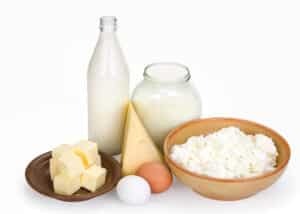
June’s National Dairy Month is a good time to consider how much milk your mom drinks. It’s estimated that 66% of older adults do not get enough calcium, so it’s very likely your mom isn’t drinking enough. Dairy is extremely important for many reasons. Companion care at home can help your senior incorporate more dairy in their diet if their doctor determines they should. Here are a few facts to know about the importance of dairy in the diet.
Women Should Get 1,200 mg of Calcium per Day
After the age of 65, women need 1,200 mg of calcium each day. How much is this? An eight-ounce glass of milk has 299 mg. It would take four glasses of milk to reach the required amount. Milk isn’t the only source, however.
- An eight-ounce serving of plain yogurt – 415 mg
- An ounce and a half of mozzarella – 333 mg
- An eight-ounce glass of enriched plain soy milk – 299 mg
- An eight-ounce glass of enriched orange juice – 261 mg
- One cup of cooked turnip greens – 197 mg
- One-third cup of almonds – 152 mg
In addition to calcium, vitamin D is essential for helping the bones absorb calcium. Vitamin D recommendations are between 800 and 1,000 IU each day. You can get vitamin D from the sun, but the risk of skin cancer often limits the amount of skin people leave uncovered.
Foods that are rich in vitamin D include tuna, sardines, salmon, and swordfish. Your mom can also get it in fortified milk, juices, and breakfast cereals. She should ask her doctor for a blood test that checks her vitamin D levels to see if they’re too low.
Understanding Hypocalcemia
Hypocalcemia is a condition where poor calcium intake can lead to weaker bones. Weak bones are more likely to fracture in a fall or accident such as dropping something on your foot. Fracturing a bone is extremely painful and can make it hard for your mom to complete her daily tasks.
You’ve probably heard of osteoporosis. This is when bones are fragile. Osteopenia is the precursor to osteoporosis. It’s a condition when scans show you have bone density, but it’s not fully at the level of osteoporosis yet. It’s important to address thinning bones ASAP.
Doctors often recommend diet and exercise first. If those aren’t enough, your mom may be told to take a calcium supplement. She might also need
If your mom struggles with her dietary needs and doesn’t have the patience or stamina to prepare home-cooked meals, you can help her. Arrange companion care at home services and have a caregiver cook for her.
With companion care at home, your mom’s caregiver can find out what she wants to eat and build shopping lists for the items that aren’t on hand. They can shop together, and your mom’s caregiver can carry in the groceries and put them away.
When it’s time for a meal, her caregiver is there to cook for her. Talk to a companion care at home specialist to learn more about meal preparation and grocery shopping services.
Sources:
https://acl.gov/sites/default/files/nutrition/Nutrition-Needs_Calcium_FINAL_508.pdf
If you are considering companion care at home in Bay City, TX for an aging loved one, please call the caring staff at At Your Side Home Care. We will answer all of your senior care questions. Call today: (832) 271-1600.
At Your Side Home Care, provides exceptional home care for seniors and families in Houston, West Houston, Katy, Memorial, The Heights, Spring Valley, Garden Oaks, Hunters Creek, River Oaks, Hilshire Village, Galleria, Cinco Ranch, Spring Branch, Sugar Land, Missouri City, Richmond, Rosenburg, Piney Point, Bay City and surrounding areas.
Our Certified Nurse Aides, 24-Hour Live-in Assistants and Home Health Aides are available 24 hours a day, 365 days a year. We also provide the security and confidence of 24-hour Telephone Assistance, so fast, reliable help is always available when it's needed. To learn more about our homecare services see our homecare services page.
Different people need different levels of homecare. To meet the requirements of our clients, At Your Side Homecare maintains consistent staffing levels of caring professionals. Homecare service is available for as little as a few hours a week, or as many as 24 hours a day, seven days a week
- How Does Senior Home Care Help Make Aging in Place Possible? - April 11, 2025
- Best Balance Exercises for Seniors - April 4, 2025
- Who Needs Respite Care? - March 28, 2025



